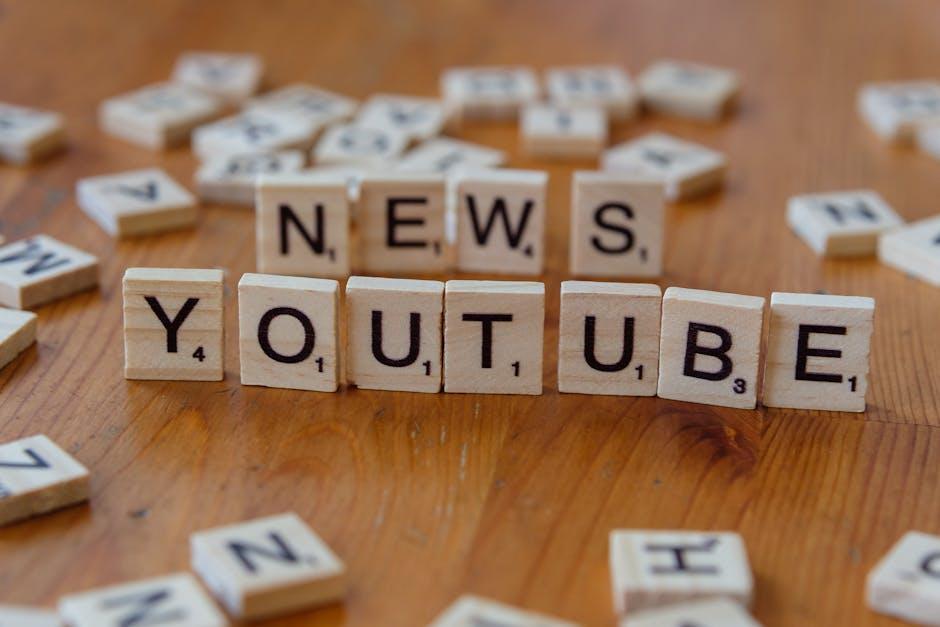Ever wonder what’s lurking beneath the surface of your favorite YouTube videos? You’re not alone! Hidden in the shadows of likes and views, the elusive dislike count holds secrets that could change the way you interact with content on the platform. Imagine being able to decode the community’s true reactions, gaining insights that go beyond just thumbs up or thumbs down. Whether you’re a content creator looking to fine-tune your videos or a curious viewer wanting to gauge a video’s true reception, understanding how to unveil those hidden dislikes is like finding a treasure map in a sea of cute cat videos. Ready to unlock the secrets of YouTube and discover what your fellow viewers really think? Let’s dive right in!
Unmasking the Mystery: Why Dislikes Matter for Content Creators

For content creators, those thumbs-down reactions aren’t just a digital form of criticism; they’re a treasure trove of insight. Think about it: every like and dislike is a piece of feedback, a way for viewers to express their feelings and preferences. When you look at those dislikes, you’re not just seeing negativity. You’re actually getting a glimpse into the hearts and minds of your audience. What didn’t resonate? Was the video too long? Too boring? Or maybe it just didn’t hit the mark on a trending topic. Understanding this can help creators refine their craft, adjusting future content to better match viewer expectations and increase overall engagement. It’s like reading the room during a live performance—if you sense a change in energy, you pivot to keep the audience engaged.
Additionally, dislikes can serve a crucial role in shaping content strategy. Here’s why they matter:
- Audience insight: Dislikes help gauge what your audience doesn’t want.
- Content direction: They guide creators on what to focus on—or avoid—moving forward.
- Ranking signals: YouTube’s algorithm takes engagement metrics seriously, meaning even dislikes can influence visibility.
- Constructive change: Dislikes motivate creators to innovate, ensuring that fresh ideas continually flow.
Maybe you think dislikes are just a digital bummer, but in reality, they’re like little road signs pointing you toward success. Keep an eye on them, interpret the signals, and watch how they can transform your content landscape!
Diving Deep: Easy Methods to Reveal Hidden Dislikes

Uncovering dislikes on YouTube might seem like a top-secret mission, but it’s easier than you think! First off, use browser extensions designed to bring those hidden thumbs down to light. Extensions like “Return Dislike” or “Dislike Counter” work magic by altering how you perceive video statistics right on your screen. Imagine each click revealing the secret sentiments of viewers—it’s like having a window into the collective opinion of your audience! You’ll find it especially useful if you’re a creator wanting feedback or simply a viewer curious about a video’s true reception.
Another method to tap into hidden dislikes is by diving into the comment section. It’s the wild west of opinions, often filled with reactions that didn’t qualify for the dislike button. You can read through the threads to see if anyone’s pointing out specific issues with the content. Think of it like an informal focus group on what’s not working! If you notice common themes, you can gauge the overall sentiment. Here’s a simple table illustrating how one might categorize comments for better analysis:
| Comment Type | Common Issues |
|---|---|
| Critiques | Poor editing, unoriginal content |
| Disappointments | Misleading titles, lack of depth |
| Suggestions | Improve pacing, add visuals |
Beyond the Numbers: Interpreting Dislike Data for Better Engagement

Digging into dislike data can feel like sifting through a treasure chest with a few rusted coins, but there’s gold hidden beneath that surface. Instead of viewing dislikes as mere negativity, consider them as a guide to understand your audience’s feelings. What if a high dislike count isn’t all doom and gloom? It could reveal critical insights into what content resonates or falls flat. By analyzing patterns, like the time of day your content receives the most dislikes, or specific topics that spark discontent, you can pivot your strategy. It’s all about turning that frown upside down! Here are a few things to ponder:
- Identify Trends: Look for recurring themes in dislikes to gain clarity on your content’s weak points.
- Engagement Opportunities: Acknowledge dislike comments; they can open dialogues and foster community.
- Content Calibration: Adjust future videos based on feedback to better align with viewer expectations.
Interpreting dislike data can also be likened to tuning a musical instrument before a big performance. You want nothing more than to hit the right notes for your audience. So, think of those dislikes as a way to fine-tune your content strategy. What was it that struck a sour chord with viewers? By asking these questions, you can transform feedback into actionable steps. Take a look at this table for a quick snapshot of how to turn dislikes into a catalyst for change:
| Dislike Reason | Actionable Response |
|---|---|
| Content Length | Shorten videos or break into series |
| Repetitive Topics | Diversify content themes |
| Poor Production Quality | Invest in better equipment |
Mastering the YouTube Algorithm: How Dislikes Influence Your Reach

When it comes to navigating the twists and turns of the YouTube algorithm, understanding how dislikes play into your channel’s reach is crucial. Think of it like a popularity contest on a school playground; the more people who engage with your video—whether it’s through likes or dislikes—the more visibility you gain. Although dislikes might sting a bit, they actually signal engagement to the algorithm. In fact, high engagement rates, even if they’re negative, tell YouTube, “Hey, look, people are talking about this!” So, instead of shying away from those thumbs-down, consider leaning into them. They can be a silver lining, shifting the way your content gets shared across the platform.
Here’s where the strategy gets juicy: analyzing the feedback from those dislikes can provide insight into what your audience truly craves. Use this feedback loop effectively by:
- Adapting Content: Make adjustments based on what viewers didn’t like.
- Experimenting: Try new formats or topics that might resonate better.
- Building Community: Engage with commenters to foster a sense of belonging and encourage open dialogues.
By embracing both the love and the hate, you’ll not only enhance viewer satisfaction but also sharpen your content strategy. Just as even the best restaurants might get a few bad reviews, it’s all about balance and using those insights to serve up something even more delicious!
To Conclude
As we wrap up this deep dive into the mysterious world of YouTube dislikes, it’s clear that unlocking these hidden metrics is just a click away! Think of it like finding the secret menu at your favorite diner—once you know what to look for, it opens up a whole new level of understanding. You now have the tools to navigate those likes and dislikes like a seasoned pro, giving you insights that can truly transform your content game. So, go ahead! Dive in, explore, and leverage this newfound knowledge to create videos that resonate with your audience. Remember, every like and dislike is a stepping stone to mastering your craft on YouTube. Happy viewing, and may your thumbs up always outweigh the thumbs down!

